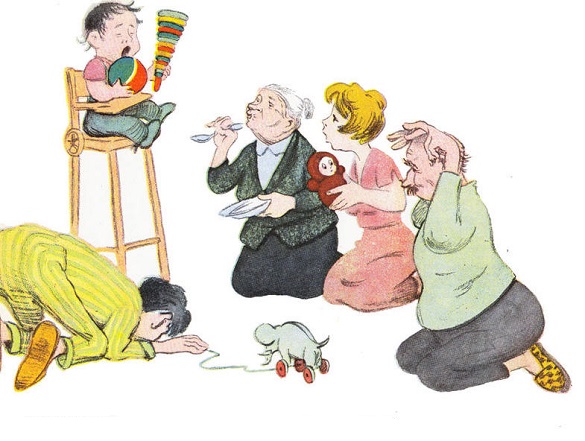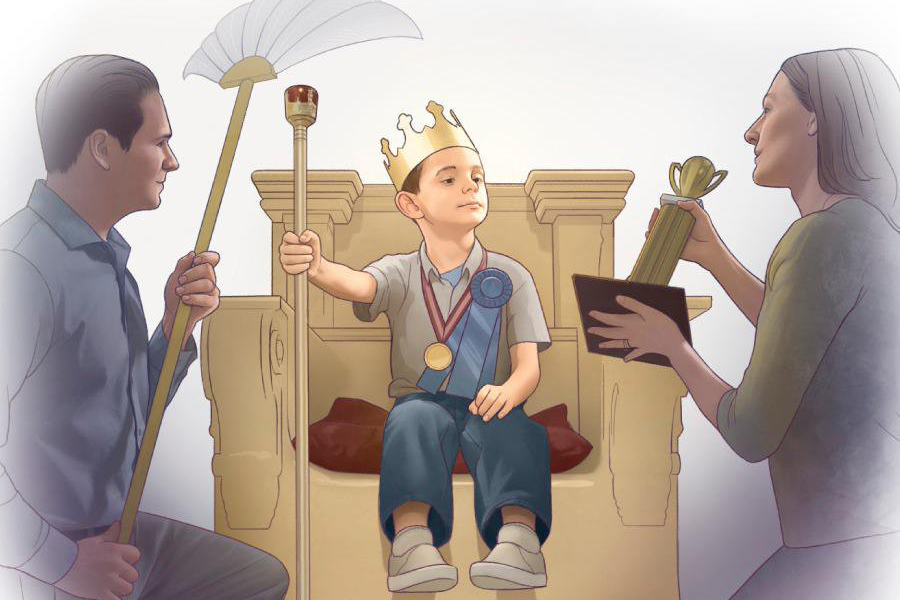Parents always try to provide the best for their children: they buy expensive toys and fashionable clothes, carefully choose the kindergarten and school, and take them to all kinds of educational and entertainment events. The desire of parents in everything to please the child is understandable, but is it beneficial to him himself? And how in the future can affect the formation of his personality?

Says Ekaterina, 42, a mother of two: “I come home to my parents and become a witness to this picture: my grandfather sets up a new game console for my boys, and my grandmother runs around with mashed potatoes and a patty at the ready, trying to feed them from a spoon. Guys rush grandfather and deny food. At the same time, I find myself thinking that it’s not annoying me that my father again spent a third of his salary on an expensive toy, and my mother tries to feed children who are already quite capable of eating on their own, but the fact that they are vaccinated with the wrong food stereotypes is in front of the TV you can’t! ”
Ekaterina is a doctor, her husband Nikolai is a programmer. Children in the family are late, long-awaited, all attention is invariably directed to them. “We devote all our free time to the health and well-being of the boys. We buy only environmentally friendly products, clothing made from natural European-made materials, we go exclusively to private clinics to see a doctor, our kindergarten is also private.
“We are parents with an eternal sense of guilt and an endless desire to give their offspring all the best,” Catherine laughs. - Doctors are selected only according to the recommendations, "in the clinic near the house they do not treat, but cripple." We buy clothes in branded stores. Products are only organic, meat from trusted farmers, grandmother’s vegetables are brought from the dacha. ”
The guys are enrolled in many circles: English, swimming, painting, karate, vocals ... going to theaters and children's studios on weekends ... We practically do not have time for ourselves. The whole evening is dedicated to transporting children to all planned activities, and then picking them up from there. I don’t remember when my husband and I went to the restaurant, the theater, and the picnic for the last time ... Our interests narrowed to the size of a children's room.
“For us parents, there are no theaters and restaurants, vacation for two. We stopped going to visit friends. Our whole life revolves around these two little blockheads. It ends when they get sick, and plays with new colors when they are happy. ”
When a psychologist tells Catherine and Nikolai that there is such a style of upbringing as “detocentrism,” they immediately recognize themselves in the description. At the same time, while agreeing that the family should have equilibrium and harmony between parents and children, they are not yet ready to revise their educational methods.According to their couple, for the harmonious development of the personalities of the kids, all attention should be given to them. But does this really benefit the children?
What is the danger of "detocentrism"?

The first problem is the complex relationships of parents. Wishing to please the child, they begin to compete with each other, find out who is more involved with the baby, spend more time with him, who bought the most interesting toy and the most beautiful jeans. The situation is aggravated by the fact that there is no time left for each other between mom and dad. They do not spend leisure time together, do not communicate on abstract topics. All their vital interests revolve around a son or daughter. The gradual separation of parents from each other and frequent conflicts in the family can cause divorce.
Another problem side is that the family policy of detocentrism harms the child himself. Psychologists compare family relationships with the laws of the wild:
“Have you ever seen a duck walking, and followed by ducklings?” Only so, and not vice versa! The duck knows where to go and leads the ducklings along. If the duckling turns the other way or lags behind his mother, then he risks dying. ”
By nature, cubs of all stripes develop an instinct to follow the female, because she knows where to go and where danger lies. This system is needed for survival in the wild. We in human society are trying to put the child at the forefront and follow all his desires. This is a huge load on the fragile children's psyche: the child does not know what to do, but at the same time tries to “lead” the parents. At the exit, we get either just a capricious baby or a child with impaired development. ”
A duck knows where to swim, where it is dangerous, where it is not dangerous, and ducklings do not know. It has evolved that the calf of a bird and a mammal is adapted — intellectually, physically, physiologically, psychologically — to follow the female. If we arrange detocentrism in the family, then we overload the child’s nervous system initially. If the nervous system is healthy, strong, we will get a moody child. If the nervous system is already unstable, we may well have a developmental disorder.
How to find balance?
So is it possible to find the notorious “golden mean” in the family? Show attention to a child without raising him to a cult? To take care of him, not forgetting that you also have needs? French child psychiatrist Marcel Rufo shares his recommendations:
- Remember that the main things in the family are parents, learn to speak the child is "no". A child who is surrounded around the clock by parental attention and guardianship, to whom everything is permitted, does not feel free. As he grows older, he will increasingly try to break out of the “cage”. From here transitional crisis and teenage riots. A child who feels like a king in a family can hardly communicate with the outside world and with peers.“A child who, on the one hand, is allowed to all, and on the other hand, is endlessly patronized and not allowed to step on his own, as if he is in an emotional prison. Sooner or later, he wants to get out of it. You must be prepared for a teenage riot. He’s afraid of the world around him, he’s afraid of communicating with his peers, and at home he considers himself a king. ”
- Do not forget about your interests. The main goal of education is to prepare the baby for adulthood. If you allow yourself to be selfish in some situations, then he will soon realize that the world does not revolve around him, others may have their own needs and desires, just like he does.
- Pay attention to your spouse. If a child grows up in an unhappy family, where parents do not care, do not think about each other, he will also be unhappy. In the future, he will not be able to learn how to competently build relationships already in his family. Do not forget to spend time with your soulmate!
- Set the boundaries of what is allowed. If parents allow or forbid the child anything, guided only by their momentary mood, then he will not be able to feel confident, understand whether he is doing well or wrong in a given situation. It is necessary for ourselves and for the baby to establish clear rules regarding the main points of everyday life.“The more predictable the child’s life, the better for him. Set the rules so that the baby knows what will happen in a given situation. They may relate to family and religious traditions, eating, daily routines, permissible and unacceptable acts and words. If this framework does not exist and everything happens as adults want at the moment, the child becomes anxious and insecure. ”
- Do not protect your baby from real life. The child must understand that he is not the center of the universe, that no one will fulfill all his desires on demand, that one must always take into account the interests of other people. Otherwise he will turn into an egoist, baby king.“A child must face reality, with the truth about himself (“ I’m not the most ”), about others (“ those around me are not obliged to fulfill all my desires ”), that life is full of limitations and surprises. If this does not happen, if the parents fulfill any wishes of the child and even predict them, if he never experiences disappointment and no one refuses him anything, he turns into a child-king, a child-tyrant. ”
Alexander Davydov about detocentrism








